初中英语知识点:反义疑问句练习试题
(完整word版)初中英语反义疑问句专项练习(附答案)
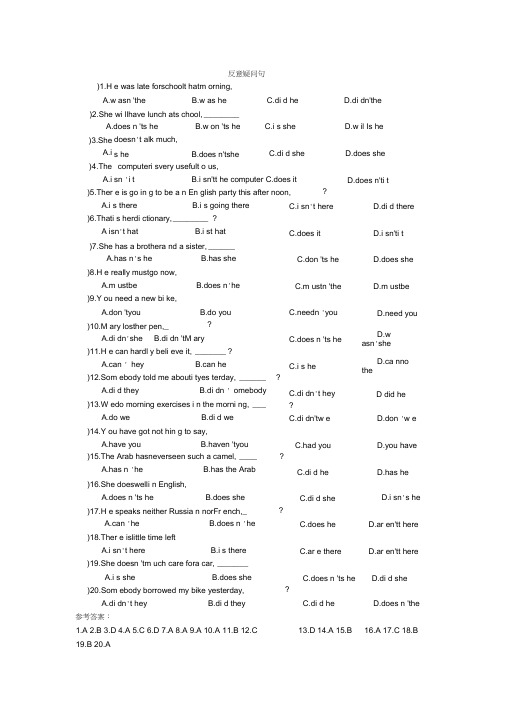
反意疑问句)1.H e was late forschoolt hatm orning, A.w asn 'the B.w as he )2.She wi llhave lunch ats chool, ________A.does n 'ts heB.w on 'ts he )3.She A.i doesn 't alk much,s he B.does n'tsheC.di d heD.di dn'the C.i s she C.di d sheD.w il Is he D.does she computeri svery usefult o us,sn 'i t B.i sn'tt he computer C.does it )5.Ther e is go in g to be a n En glish party this after noon, A.i s there B.i s going there )6.Thati s herdi ctionary, ________ ? A isn 't hat B.i st hat )4.The A.i )7.She has a brothera nd a sister, ______A.has n 's heB.has she )8.H e really mustgo now,A.m ustbeB.does n 'he )9.Y ou need a new bi ke,A.don 'tyou )10.M ary losther pen,_A.di dn 'sheB.do you ?B.di dn 'tM ary)11.H e can hardl y beli eve it, _______ ?A.can ' heyB.can he)12.Som ebody told me abouti tyes terday, ______ A.di d they B.di dn ' omebody )13.W edo morning exercises i n the morni ng, ___ A.do we B.di d we )14.Y ou have got not hin g to say,A.have youB.haven 'tyou )15.The Arab hasneverseen such a camel, ____A.has n 'heB.has the Arab )16.She doeswelli n English,A.does n 'ts heB.does she )17.H e speaks neither Russia n norFr ench,_A.can 'heB.does n 'he)18.Ther e islittle time leftA.i sn 't hereB.i s there)19.She doesn 'tm uch care fora car, _______A.i s sheB.does she D.does n'ti t)20.Som ebody borrowed my bike yesterday, A.di dn 't hey B.di d they 参考答案: C.i sn 't here D.di d there C.does it D.i sn'ti t C.don 'ts he D.does she C.m ustn 'the D.m ustbe C.needn 'you D.need you C.does n 'ts he D.w asn 'sheC.i s heD.ca nno theC.di dn 't hey D did he?C.di dn'tw eD.don 'w e C.had you D.you haveC.di d heD.has he C.di d she D.i sn 's heC.does heD.ar en'tt here C.ar e there D.ar en'tt here C.does n 'ts he D.di d she C.di d he D.does n 'the?? ???1.A2.B3.D4.A5.C6.D7.A8.A9.A 10.A 11.B 12.C 13.D 14.A 15.B16.A 17.C 18.B19.B 20.A。
初中英语反义疑问句练习(含答案)
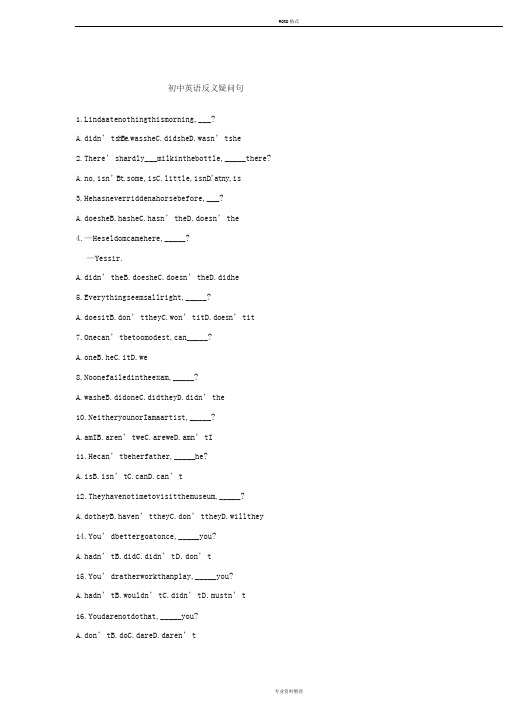
初中英语反义疑问句1.Lindaatenothingthismorning,___?A.didn’ts h B e.wassheC.didsheD.wasn’tshe2.There’shardly___milkinthebottle,_____there?.atny,isA.no,isn’Bt.some,isC.little,isnD’3.Hehasneverriddenahorsebefore,___?A.doesheB.hasheC.hasn’theD.doesn’the4.—Heseldomcamehere,_____?—Yessir.A.didn’theB.doesheC.doesn’theD.didhe5.Everythingseemsallright,_____?A.doesitB.don’ttheyC.won’titD.doesn’tit7.Onecan’tbetoomodest,can_____?A.oneB.heC.itD.we8.Noonefailedintheexam,_____?A.washeB.didoneC.didtheyD.didn’the10.NeitheryounorIamaartist,_____?A.amIB.aren’tweC.areweD.amn’tI11.Hecan’tbeherfather,_____he?A.isB.isn’tC.canD.can’t12.Theyhavenotimetovisitthemuseum,_____?A.dotheyB.haven’ttheyC.don’ttheyD.willthey14.You’dbettergoatonce,_____you?A.hadn’tB.didC.didn’tD.don’t15.You’dratherworkthanplay,_____you?A.hadn’tB.wouldn’tC.didn’tD.mustn’t16.Youdarenotdothat,_____you?A.don’tB.doC.dareD.daren’t18.Hedislikesthetwosubjects,_____he?A.doesB.doesn’tC.isD.isn’t19.Thesetoolsareuselessnow,_____?A.aretheyB.aren’ttheyC.isitD.isn’tit20.Heusedtogetupat6:30,_____he?A.didn’theB.didheedheD.wouldn’the22.Heoughttowinthefirstprize,_______he?A.mustn’tB.oughtn’tC.shouldn’tD.BothBandC.23.Let’sgotherebybus,___?A.willyouB.shallweC.don’tyouD.willyou24.Letusgotoplayfootball,___?A.willyouB.shallweC.doweD.arewe25.Don’tforgettogivePollysomefoodandchangeherwater,___?A.willyouB.shallweC.won’tyouD.doyou26.—Let’sgoshoppingthisafternoon,_____?—Allright.A.willweB.shallweC.don’tweD.arewe27.—Passmethedictionary,_____?—Yes,withpleasure.A.wouldyouB.willyouC.won’tyouD.wouldn’tyou30.Thereislittlewaterintheglass,____?A.isn’tthereB.isn’titC.isitD.isthere32.Therewon’tbeanyconcertthisS a t u e r d v e a n y i n g,_____?A.willtherenotB.willthereC.isthereD.won’t33.—IguessshetaughtherselfJapanese,______?—Yes.A.don’tIB.didsheC.doID.didn’tshe34.Idon’tbelieveyouareright,_____?A.areyouB.doyouC.won’tyouD.do35.Shedoesn’tthinkthatTomsingsbestintheclass,_____?A.doessheB.doesn’tsheC.doesheD.doesn’the37.Iknowyoudidn’twanttohurtme,_____?A.didyouB.didn’tyouC.doID.don’tI38.Ifmyfatherwereherehewouldbeveryhappy,_____?A.weren’theB.wereheC.wouldn’theD.wouldheKey:1—5CDBDD6—10BACDC11—15AABAB16—20CCBBA 21—25CDBAA26—30BBBAD31—35BBDAA36—38AAC。
反义疑问句练习题目及答案
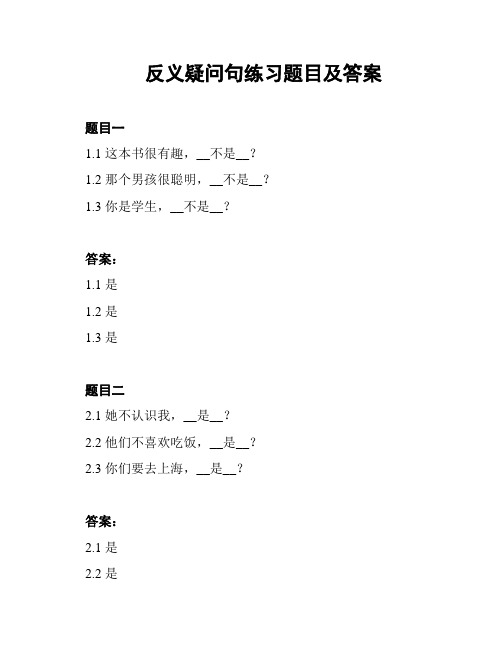
反义疑问句练习题目及答案题目一1.1 这本书很有趣,__不是__?1.2 那个男孩很聪明,__不是__?1.3 你是学生,__不是__?答案:1.1 是1.2 是1.3 是题目二2.1 她不认识我,__是__?2.2 他们不喜欢吃饭,__是__?2.3 你们要去上海,__是__?答案:2.1 是2.2 是2.3 是题目三3.1 他不喜欢看电视,__是__?3.2 你不觉得这个问题很有意思,__是__?3.3 她没去过北京,__是__?答案:3.1 是3.2 是3.3 是题目四4.1 他们不会唱歌,__是__?4.2 这是个好主意,__不是__?4.3 他喜欢看电影,__不是__?答案:4.1 是4.2 不是4.3 不是题目五5.1 她不懂汉语,__是__?5.2 你会游泳,__是__?5.3 他们喜欢吃饭,__是__?答案:5.1 是5.2 是5.3 是题目六6.1 这不是你的手机,__是__?6.2 你不喜欢这个颜色,__是__?6.3 他们会来参加聚会,__是__?答案:6.1 是6.2 是6.3 是题目七7.1 他没有听说过这个地方,__是__?7.2 你不想去旅行,__是__?7.3 她知道这个答案,__是__?答案:7.1 是7.2 是7.3 是题目八8.1 我今天晚上有时间,__不是__?8.2 他没有考试,__是__?8.3 你们都明白这个问题,__是__?答案:8.1 不是8.2 是8.3 是。
(完整版)初中英语反义疑问句练习(含答案)
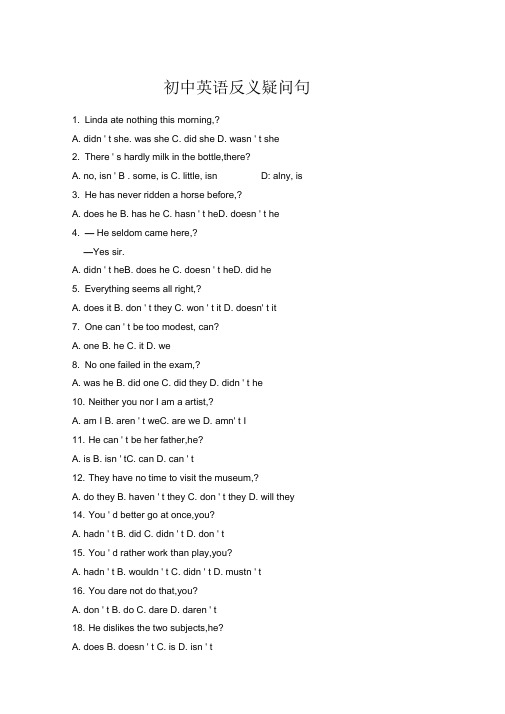
初中英语反义疑问句1. Linda ate nothing this morning,?A. didn ' t she. was she C. did she D. wasn ' t she2. There ' s hardly milk in the bottle,there?A. no, isn ' B . some, is C. little, isn D: alny, is3. He has never ridden a horse before,?A. does heB. has heC. hasn ' t heD. doesn ' t he4. — He seldom came here,?—Yes sir.A. didn ' t heB. does heC. doesn ' t heD. did he5. Everything seems all right,?A. does itB. don ' t theyC. won ' t itD. doesn' t it7. One can ' t be too modest, can?A. oneB. heC. itD. we8. No one failed in the exam,?A. was heB. did oneC. did theyD. didn ' t he10. Neither you nor I am a artist,?A. am IB. aren ' t weC. are weD. amn' t I11. He can ' t be her father,he?A. isB. isn ' tC. canD. can ' t12. They have no time to visit the museum,?A. do theyB. haven ' t theyC. don ' t theyD. will they14. You ' d better go at once,you?A. hadn ' tB. didC. didn ' tD. don ' t15. You ' d rather work than play,you?A. hadn ' tB. wouldn ' tC. didn ' tD. mustn ' t16. You dare not do that,you?A. don ' tB. doC. dareD. daren ' t18. He dislikes the two subjects,he?A. doesB. doesn ' tC. isD. isn ' t19. These tools are useless now,?A. are theyB. aren ' t theyC. is itD. isn ' t it20. He used to get up at 6:30,he?A. didn ' t heB. did heC. used heD. wouldn ' t he22. He ought to win the first prize,he?A. mustn ' tB. oughtn ' tC. shouldn ' tD. Both B and C.23. Let ' s go there by bus,?A. will youB. shall weC. don ' t youD. will you24. Let us go to play football,?A. will youB. shall weC. do weD. are we25. Don ' t forget to give Polly some food and change her water,?A. will youB. shall weC. won ' t youD. do you26. — Let ' s go shopping this afternoon,?—All right.A. will weB. shall weC. don ' t weD. are we27. — Pass me the dictionary,?—Yes, with pleasure.A. would youB. will youC. won ' t youD. wouldn ' t you30. There is little water in the glass,?A. isn ' t thereB. isn ' t itC. is itD. is there32. There won ' t be any concert this SatueVaying,?A. will there notB. will thereC. is thereD. won ' t33. — I guess she taught herself Japanese,?—Yes.A. don ' t IB. did sheC. do ID. didn ' t she34. I don ' t believe you are right,?A. are youB. do youC. won ' t youD. do35. She doesn ' t think that Tom sings best in the class,?A. does sheB. doesn ' t sheC. does heD. doesn ' t he37. I know you didn ' t want to hurt me,?A. did youB. didn ' t youC. do ID. don ' t I38. If my father were here he would be very happy,?A. weren ' t heB. were heC. wouldn ' t heD. would heKey: 1 — 5 CDBDD 6 —10 BACDC 11 —15 AABAB 16 — 20CCBBA21 — 25CDBAA 26 — 30 BBBAD 31 — 35 BBDAA 36 — 38AAC。
初中专项练习 反义疑问句(含答案)
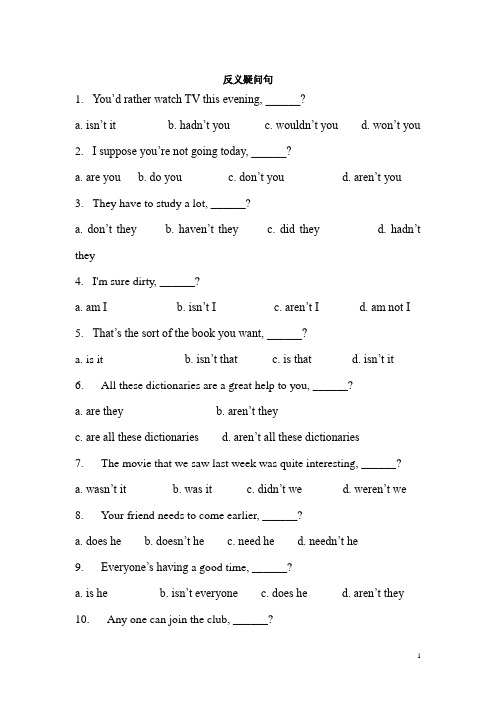
反义疑问句1. You’d rather watch TV this evening, ______?a. isn’t itb. hadn’t youc. wouldn’t youd. won’t you2. I suppose you’re not going today, ______?a. are youb. do youc. don’t youd. aren’t you3. They have to study a lot, ______?a. don’t theyb. haven’t theyc. did theyd. hadn’t they4. I'm sure dirty, ______?a. am Ib. isn’t Ic. aren’t Id. am not I5. That’s the sort of the book you want, ______?a. is itb. isn’t thatc. is thatd. isn’t it6. All these dictionaries are a great help to you, ______?a. are theyb. aren’t theyc. are all these dictionariesd. aren’t all these dictionaries7. The movie that we saw last week was quite interesting, ______?a. wasn’t itb. was itc. didn’t wed. weren’t we8. Your friend needs to come earlier, ______?a. does heb. doesn’t hec. need hed. needn’t he9. Everyone’s having a good time, ______?a. is heb. isn’t everyonec. does hed. aren’t they10. Any one can join the club, ______?a. can any oneb. can’t any onec. can’t theyd. can they11. Let’s listen to the radio program that the t eacher mentioned, ______?a. do web. don’t wec. shall wed. shan’t we12. Janet used to take part in labor in that village, ______?a. used sheb. did shec. didn’t shed. should she13. What beautiful weather, ______?a. is itb. isn’t itc. won’t itd. doesn’t it14. Nobody will believe how difficult his work has been ______?a. will heb. won’t nobodyc. will theyd. won’t they15. You must be hungry, ______?a. must youb. mustn’t youc. are youd. aren’t you CAACD,BABDC,CCBCD;。
初中英语疑问句反义疑问句专项练习
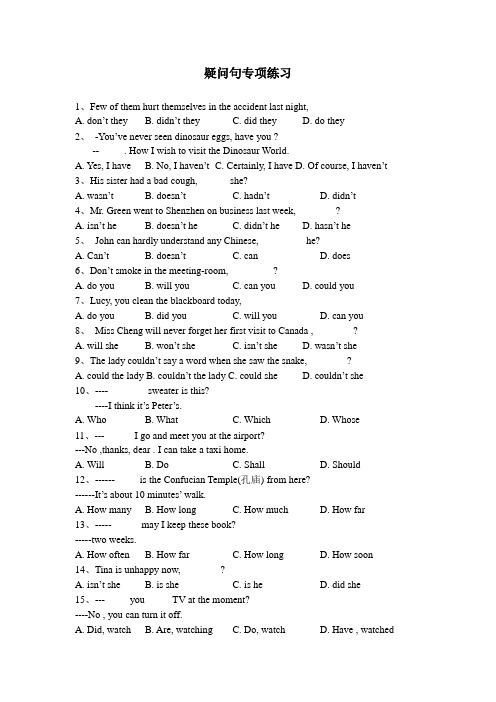
疑问句专项练习1、Few of them hurt themselves in the accident last night,________A. don’t theyB. didn’t theyC. did theyD. do they2、-You’ve never seen dinosaur eggs, have you ?--_____. How I wish to visit the Dinosaur World.A. Yes, I haveB. No, I haven’tC. Certainly, I haveD. Of course, I haven’t3、His sister had a bad cough, ______she?A. wasn’tB. doesn’tC. hadn’tD. didn’t4、Mr. Green went to Shenzhen on business last week,________?A. isn’t heB. doesn’t heC. didn’t heD. hasn’t he5、John can hardly understand any Chinese, _________he?A. Can’tB. doesn’tC. canD. does6、Don’t smoke in the meeting-room,_________?A. do youB. will youC. can youD. could you7、Lucy, you clean the blackboard today,_______A. do youB. did youC. will youD. can you8、Miss Cheng will never forget her first visit to Canada ,________?A. will sheB. won’t sheC. isn’t sheD. wasn’t she9、The lady couldn’t say a word when she saw the snake,________?A. could the ladyB. couldn’t the ladyC. could sheD. couldn’t she10、----________sweater is this?----I think it’s Peter’s.A. WhoB. WhatC. WhichD. Whose11、---______I go and meet you at the airport?---No ,thanks, dear . I can take a taxi home.A. WillB. DoC. ShallD. Should12、------_____is the Confucian Temple(孔庙) from here?------It’s about 10 minutes’ walk.A. How manyB. How longC. How muchD. How far13、-----______may I keep these book?-----two weeks.A. How oftenB. How farC. How longD. How soon14、Tina is unhappy now,________?A. isn’t sheB. is sheC. is heD. did she15、---_____you _____TV at the moment?----No , you can turn it off.A. Did, watchB. Are, watchingC. Do, watchD. Have , watched16、----_____do you go to Hong Kong?----Sorry , I’ve never been there.A. How longB. How oftenC. How farD. How soon17、A: ______you ever _____ the Great Wall?B: Only once.A. Did ,goB. Have , been toC. Have ,gone toD. Have ,been in18、----You lent me some money a few months ago.-----_____? I don’t remember lending you any money.A. Did IB. Did youC. Do ID. Do you19、----______is it from here to the railway station?----About two kilometers.A. How oftenB. How farC. How soonD. How long20、----Are you going to borrow a dictionary or a magazine?----______.A. Yes, a dictionaryB. No, a magazineC. A dictionaryD. Yes, both21、My uncle has never been to a foreign country,_______?A. has heB. does heC. hasn’t heD. doesn’t he22、There is some water in that bottle, isn’t _______A. thereB. itC. thatD. those23、----_______will the foreign students be back from Nanjing.----In two days, I think.A. How soonB. How oftenC. How farD. How fast24、----Have you seen the film Return Of the King ?-----_______. I going to see it tonight.A. No, I didn’tB. Yes, I doC. Yes, I haveD. Not yet25、----John, will you please paint the door yellow?----__________?A. WhyB. What is itC. How is itD. How about26、---Let’s go and play football,__________?---That’s wonderful.A. will youB. do youC. won’t youD. shall we27、---The boy has to stay at home to look after his little sister,_______?---Yes, because his mother has gone shopping.A. does heB. is heC. doesn’t heD. hasn’t he28、---You won’t follow his example, will you?---________________, I don’t think he is right.A. No, I won’tB. Yes, I willC. No, I willD. Yes, I won’t29、----____________?---The one behind the tree.A. Whose girlB. Who’s that girlC. Which girlD. Where’s the girl30、______the population of china?A. How manyB. How muchC. How’sD. What’s二、句型转换,根据要求改写句子。
(完整版)初中英语知识点:反义疑问句练习试题
【选项】A. is heB. isn't heC. has heD. hasn't heCHe's never visited此处的He's和后面的visited构成现在完成时,所以He's = He has;副词never是否定词,所以这里的反意疑问句应为肯定形式has he。
2、The robot never gets tired, __________?【选项】A. does itB. doesn't itC. does the robotD. doesn't the robotA本题考查反意疑问句的构成:前半部分是否定,后半部分用肯定;本题中的never表示“否定”,故本题选A。
3、(2012江苏无锡)-Your brother often disagrees with you, __________ he?-__________. We often have different opinions.【选项】A. does, YesB. doesn't ; YesC. does ; NoD. doesn't ; NoB考查反意疑问句。
反意疑问句,陈述部分是肯定句,反意疑问句部分用否定形式,本句的陈述部分谓语动词虽是disagree,意为“不同意”,但否定前缀,不能视为否定词。
故反意疑问句仍用否定形式doesn't,其回答部分事实与陈述部分事实相同。
故作肯定回答。
故选B。
4、—She's already returned from Shanghai, __________?—No. She will come back tomorrow.【选项】A. isn't she B. hasn't she C. doesn't she D. has sheB由returned可推出She's是She has的缩写,是现在完成时;前句肯定,后句否定,所以用hasn't she。
(完整版)反义疑问句练习题及答案讲解
反义疑问句练习1.Zhou Ming has few English magazines, ________?A.does heB.doesn’t heC.has heD.hasn’t he2.Cindy could hardly speak English three years ago, ________?A. couldn't she?B. could sheC. can she3.Alice had a wonderful time yesterday, _______?A. hadn’t sheB. wasn’t sheC. didn’t sheD. wouldn’t she 4.–She didn’t come to schoolyesterday, did she?–______, though she was not feeling well.A. No, she didn’tB. Yes, she didn’tC. No, she didD. Yes, she did5.---He hardly spent any time on his subjects, ________?---________, so he does badly in his lessons.A .didn’t he, Yes B. did he, Yes C. didn’t he, No D. did he, No 6.He’s read this book before, ?A. hasn’t heB. doesn’t heC. isn’t heD. wasn’t he 7.–Let’s go for a walk, ______?-- OK, I’m coming . Don’t forget to bring your camera, ______? A. will you; will you B. will you; shall weC. shall we; shall weD. shall we; will you8.John had a short walk after lunch, ________?A. did heB. didn't heC. had heD. hadn't he9.Nancy hardly rings you up, ___________?A. doesn’t sheB. does sheC. doesn’t NancyD. does Nancy 10.---Your brother often disagrees with you, _______ he ?--- _______. We often have different opinions.A.does; YesB. doesn’t ;YesC. does; NoD. doesn’t; No 11.Kate’s never late for school,?A.isn’t sheB.hasn’theC.is sheD.has she12.--- Liu Tao has never read the book The Adventure of Tom Sawyer , _______ he?--- _____. He told me it's very interesting. He'd like to read it again.A. is; No, he isn'tB. has; Yes, he hasC. isn’t; Yes, he isD. hasn’t; No, he hasn't13.—He’s never late for school, ________?—No, he isn’t .He is always very early.A. is heB. isn’t heC. hasn’t heD. has he 14.—There’s little meat left in the fridge, ________?—________. I’ll get some on my way home.A. is there, YesB. isn’t there, YesC. is there, NoD. isn’t there, No15.—Tom finished his homework, didn’t he?—__________, though he was ill yesterday.A. No, he didn’tB. Yes, he didC. Yes, he doesD. No, he doesn’t16.There is little water in the cup, ?A. is thereB. isn’t thereC. isn’t itD. is it17. He’s still not understood by his close friend although he has said sorryto him, _________?A. hasn’t heB. has heC. isn’t heD. is he18.You have never visited the place before, you?A. didB. didn’tC. haveD. haven’t19.Don't keep poison in the kitchen, _______?A. do youB. shall weC. will youD. don't you20.There are no museums in our city, _________?A. aren’t thereB. are thereC. is thereD. isn’t there21.Your father is playing the piano very well, he?A.isB.isn’tC.doesD.doesn’t22.—It’s her birthday tomorrow, ______ ?—Yes, let’s have a surprise party for her.A. isn’t itB. isn’t sheC. doesn’t itD. doesn’t she23.--- He’s never stolen anything before, _______ he?--- ________. It’s h is third time to be taken to the police station.A. hasn’t; YesB. has; NoC. has; YesD. is; No24.—It’s her birthday tomorrow, ______ ?—Yes, let’s have a surprise party for her.A. isn’t itB. isn’t sheC. doesn’t itD. doesn’t she25.-----Your father never watched the drama series on TV, __________? -----_____________________. He thinks theses drama series are boring and dull.A.does he; Yes, he does.B. does he; No, he doesn’tC. doesn’t he ; Yes, he does.D. doesn’t he ; No, he doesn’t .26.—Tom is an honest boy, _______ he?—Yes. We trust him all the time.A. isn’tB. isC. doesD. doesn’t27.Good, you’ve done it well! You need no more help from us, ______.?A. do youB. need youC. don’t youD. needn’t you28.His father had an important meeting just now, _______?A. did heB. had heC. didn't heD. hadn't he29.-- You used to be short, didn’t you?-- _______. I was the shortest in my class.A. Yes, I did.B. No, I didn’t.C. Yes, I was.D. No, I wasn’t.参考答案1.A【解析】试题分析:句意为:周明几乎没有英语杂志对吗?这是一个反义疑问句,反义疑问句的结构遵循前肯定后否定或者前否定后肯定,前后人称、时态一致的原则。
(完整版)反义疑问句练习题(附答案)
反意疑问句一、祈使句后的反意疑问句:祈使句后加一个反意疑问句,使祈使句变得更加委婉。
肯定祈使句的反意疑问句通常用will you, won’t you, would you, can you, can’t you等来表达不同的含义。
在否定的祈使句后的反意疑问句通常只用will you。
1、表示“请求”,肯定祈使句的反意疑问句用will you。
如:Give me a hand, will you?2、表示“邀请”、“劝诱”时,肯定祈使句后的反意疑问句用won’t you。
如:Have another cup of tea, won’t you?3、表示“催促”、“不耐烦”时,肯定祈使句后的反意疑问句用can’t you。
如:Stop talking, can’t you?4、用“Let’s…”开头的肯定祈使句表示“提议、建议、主张”,其后的反意疑问句用shall we。
如:Let’s have a try, shall we?但是以Let us…或Let me…开头的祈使句后的反意疑问句则要用will you。
如:Let us go now, will you?5、否定祈使句的反意疑问句只用will you。
如:Don’t take away my dictionary, will you?以Let’s not…开头的祈使句后的反意疑问句,用all right或OK。
二、复合句的反意疑问句其反意疑问的主谓语视其主要内容而定,不能一概说以主句为准还是以从句为准。
1、多数复合句后的反意疑问句的主、谓语同主句的主、谓语一致。
如:He said he was a teacher, didn’t he2、①主句是I think(suppose, consider, believe, guess, expect, imagine, feel, am afraid, hear, say等)+宾语从句时,反意疑问句的主、谓语应与从句的主、谓语一致。
(完整版)初中英语反义疑问句经典练习(含答案)(改)
反义疑问句练习题1. Linda ate nothing this morning, ___? A. didn’t she B. was she C. did she D. wasn’t she2. There’s hardly___ milk in the bottle, _____there? A. no, isn’t B. some, is C. little, isn’t D. any, is3. He has never ridden a horse before, ___? A. does he B. has he C. hasn’t he D. doesn’t he4. — He seldom came here, _____? — Yes sir. A. didn’t he B. does he C. doesn’t he D. did he5. Everything seems all right, _____ ? A. does it B. do n’t they C. won’t it D. doesn’t it7. One can’t be too modest, can _____ ? A. one B. he C. it D. we8. No one failed in the exam, _____ ? A. was he B. did one C. did they D. didn’t he11. He can’t be her father, _____ he? A. is B. isn’t C. can D. can’t12. They have no time to visit the museum, _____? A. do they B. haven’t they C. don’t they D. will they18. He dislikes the two subjects, _____ he? A. does B. doesn’t C. is D. isn’t19. These tools are useless now, _____ ? A. are they B. aren’t they C. is it D. isn’t it23. Let’s go there by bus, ___? A. will you B. shall we C. don’t you D. will you24. Let us go to play football, ___? A. will you B. shall we C. do we D. are we25. Don’t forget to give Polly some food and change her water, _? A. will you B. shall we C. won’t you D. do you26. —Let’s go shopping this afternoon, _____? — All right.A. will weB. shall weC. don’t weD. are we27. — Pass me the dictionary, _____? — Yes, with pleasure.A. would youB. will youC. won’t youD. wouldn’t you30. There is little water in the glass, ____? A. isn’t there B. isn’t it C. is it D. is there32. There won’t be any concert this Saturday evening, _____ ? A. will there not B. will there C. is there D. won’t33. — I guess she taught herself Japanese, ______? — Yes. A. don’t I B. did she C. do I D. didn’t she34. I don’t believe you are right, _____ ? A. are you B. do you C. won’t you D. do35. She doesn’t think that Tom sings best in the class, _____ ? A. does she B. doesn’t she C. does he D. doesn’t he37. I know you didn’t want to hurt me, _____ ? A. did you B. didn’t you C. do I D. don’t I38. If my father were here he would be very happy, _____ ? A. weren’t he B. were he C. wouldn’t he D. would he1.It’s very hot today, _______________ ?2. He can speak Chinese, _______________ ?3. Meimei studies in a middle school, _______________ ?4. He never gets up late , _______________ ?5. Don’t go out at night, _______________ ?6.He never loves cold weather , _______________ ?7. You finished the task yesterday, _______________ ? 9.Tom has been to Singapore , _______________ ?10.The story is little interesting, _______________ ?11.Everything starts to grow in spring, _______________ ? 12.He can hardly finish his homework, _______________ ?13.I’m in Clas s 3,Grade 2, _______________ ? 14.Let’s go shopping , _______________ ?15.She doesn’t like clim bing hills , _______________ ? 16.I don’t think it is cold today, _______________ ?17. You think he is a good flight attendant, _______________ ? 18.Nobody knows where she lives, _______________ ?19.Few students can answer the question, _______________ ? 20.Mike likes English, _______________ ?21.That was a wonderful night, _______________ ? 22.Your sister helped him, _______________ ?23.Tom is skating, _______________ ?24.You aren’t a teacher, _______________ ?25.They haven’t been to the Great Wall, _______________ ? 26.You will join the soccer team, _______________ ?27.He likes neither apples nor pears, _______________ ? 28.There are some good books for you, _______________ ?29.They have been there twice, _______________ ? 30.Let’s do it now, _______________ ?31.You dislike this kind of gifts, _______________ ? 32.Nothing is impossible, _______________ ?33.Everything is possible, _______________ ? 34.He doesn’t go to school by bus, _______________ ?35.There is little milk left in the bottle, _______________ ?36.Let us clean the classroom by ourselves, _______________ ?37.He has studied here for about four years, _______________ ?38.You have never lost money before, _______________ ?39.Few of them hurt themselves in the accident last night, _______________ ?40.Peter could hardly see the words on the blackboard, _______________ ?41.She’s American, _______________ ? 42.There will be a volleyball match in our school, _______________ ? 43.Don’t smoke in the reading-room, _______________ ? 44.I don’t think he is right, _______________ ?45.You must do your homework by yourself, _______________ ?46.You mustn’t touch the machine, _______________ ?47.He must be a worker, _______________ ? 48.Someone looked for me yesterday, _______________ ?49.I’m a teacher, _______________ ? 50.What a nice watch, _______________ ?51.I wish to use your ruler, _______________ ? 52.I have to stay at home, _______________ ?53.You’d better wear warm clothes today, _______________ ?54.What he needs is his parents’ love, _______________ ?55.Yo u’d like a cup of tea, _______________ ? 56.Don’t be late again, _______________ ?57.Their prices are really low, _______________ ? 58.Reading is good for you to learn English, _______________ ? 59.No one knows about it, _______________ ? 60.I think you should study hard, _______________ ?Key: 1—5 CDBDD 6—10 BACDC 11—15 AABAB 16—20 CCBBA 21—25CDBAA 26—30 BBBAD 31—35 BBDAA 36—38 AAC附加答案:1 . isn’t it 2. can’t he 3.doesn’t she 4.does he 5.will you6. does he7.didn’t you8. isn’t9.hasn’t he10.is it11.doesn’t it 12.can he 13 .aren’t I 14.shall we 15.does she16.is it 17.don’t you18does it 19. can they 20.doesn’t he21.wasn’t it 22.didn’t she 23.isn’t he 24.are you 25.have they26.wont you 27.does he 28.aren’t there 29.haven’t they 30.shall we31.don’t you 32.is it 33.isn’t it 34.does he 35.is there36.will you 37.hasn’t he 38.have you 39.did they 40.could he41.isn’t she 42.won’t there 43.will you 44.is he 45.mustn’t you46.must you 47.isn’t he 48.didn’t they 49.aren’t I 50.isn’t it51.may I 52.don’t I 53.hadn’t you 54.isn’t it 55.wouldn’t you56.will you 57.aren’t they 58.isn’t it 59.do they 60.shouldn’t you。
- 1、下载文档前请自行甄别文档内容的完整性,平台不提供额外的编辑、内容补充、找答案等附加服务。
- 2、"仅部分预览"的文档,不可在线预览部分如存在完整性等问题,可反馈申请退款(可完整预览的文档不适用该条件!)。
- 3、如文档侵犯您的权益,请联系客服反馈,我们会尽快为您处理(人工客服工作时间:9:00-18:30)。
He's never visited Thailand before, __________?【选项】A. is heB. isn't heC. has heD. hasn't heCHe's never visited此处的He's和后面的visited构成现在完成时,所以He's = He has;副词never是否定词,所以这里的反意疑问句应为肯定形式has he。
2、The robot never gets tired, __________?【选项】A. does itB. doesn't itC. does the robotD. doesn't the robotA本题考查反意疑问句的构成: 前半部分是否定,后半部分用肯定;本题中的never表示“否定”,故本题选A。
3、(2012 江苏无锡)-Your brother often disagrees with you, __________ he?-__________. We often have different opinions.【选项】A. does, YesB. doesn't ; YesC. does ; NoD. doesn't ; NoB考查反意疑问句。
反意疑问句,陈述部分是肯定句,反意疑问句部分用否定形式,本句的陈述部分谓语动词虽是disagree, 意为“不同意”,但否定前缀,不能视为否定词。
故反意疑问句仍用否定形式doesn't, 其回答部分事实与陈述部分事实相同。
故作肯定回答。
故选B。
4、—She's already returned from Shanghai, __________ ?—No. She will come back tomorrow.【选项】A. isn't sheB. hasn't sheC. doesn't sheD. has sheB由returned可推出She's是She has的缩写,是现在完成时;前句肯定,后句否定,所以用hasn't she。
故选B。
5、(2012江苏太仓第二学期期中调研) He's never visited China, __________ ?【选项】A. hasn't heB. doesn't heC. is heD. has heD陈述部分是一个现在完成时的否定句,never为否定词。
故选D。
6、—Jim's never been to California, __________ ?—No , never. But he's going there next month.【选项】A. is heB. has heC. isn't heD. hasn't heBnever表否定含义,所以后面的简短问句须用肯定形式,由been可知本句是现在完成时, Jim's 是Jim has的缩写形式。
所以选B。
7、Linda has never been to Italy, __________ ?【选项】A. has sheB. hasn't sheC. does sheD. doesn't sheA根据never可知,反意疑问部分应用肯定形式,且助动词用 has。
8、I don't think he understood your question, __________ ?【选项】A. did IB. didn't IC. did heD. didn't heCthink的主语是第一人称时,反意疑问部分应和从句的主语谓语保持一致,且陈述部分表否定,故反意疑问部分用肯定形式,所以正确答案为C项。
9、(2012 湖北孝感中考)—She's never spoken to a foreigner, __________ ?—Yes. She's active and can speak English freely.【选项】B. has sheC. isn't sheD. hasn't she考查反意疑问句。
陈述句“She's never spoken to a foreigner ,”中有表示否定意义的副词never,并且此句是现在完成时态,故疑问部分应该用has的肯定形式构成。
10、We had better wait for your girlfriend Juliet, __________ ?【选项】A. hadn't weB. don't weC. didn't weD. shan't we考查had better的反意疑问句的用法。
11、(2010 浙江杭州)Alice had a wonderful time yesterday, __________?B. wasn't sheC. didn't sheD. wouldn't sheC本句为前肯后否的反意疑问句, had在此为实义动词,故选C。
12、(2012黑龙江绥化模拟)-You had nothing for breakfast this morning, __________?-No, I got up too late.A. did youB. had youC. didn't youA反意疑问句前面有nothing表示否定概念,附加问句用肯定形式,句子中had是实义动词,故附加问句中用助动词 did。
13、There were few new words in the English competition for your daughter,__________?A. were thereB. weren't thereC. aren't thereD. are thereA考查反意疑问句的用法。
根据时态一致原则排除C 和D。
又由于few表示否定,故答案为A。
14、(2012河北衡水仿真冲刺)They have never been to the Great Wall, __________?A. haven't theyB. don't theyC. have theyD. do theyC前面句子中含有never, 故后面要用肯定的反问;本句用的是现在完成时,主语为they, 故选C。
15、(2013河北衡水五校联考质检联合调研)There was little money left yesterday, __________?A. was thereB. wasn't thereC. was itD. wasn't itA此题考查反意疑问句和little的用法。
little有否定之意,根据反意疑问句“前肯后否,前否后肯”的原则,可知选A。
16、-Mr. Wang's never been to Canada, has he?-__________. He went there on business last week.A. No, he hasn'tB. Yes, he hasC. No, he hasD. Yes, he hasn'tB反意疑问句的回答遵循事实原则。
由后一句“他上周刚去那里出差”可知“他去过”,故要采用肯定的回答。
17、He seldom finishes his homework, __________ he?A. isn'tB. isC. doesD. doesn'tC句意:他很少完成他的作业,是吗? seldom是否定意义的副词,后面应用肯定形式,又因为主语是He, 谓语动词是finishes, 所以助动词应用does。
18、They won't quarrel with each other any longer, __________?A. will theyB. won't theyC. don't theyD. do theyAnot... any longer, no longer; not... any more, no more 都具有否定意义,用于反意疑问句时,反意疑问部分应用肯定形式。
故选A。
19、(2013 湖北十堰)There's little important news in the newspaper today, __________?A. isn't thereB. is thereC. is itD. are thereB此题考查反意疑问句和little的用法。
little表示否定意义。
根据反意疑问句前否后肯的原则,可知选B。
20、(2012 浙江杭州中考) Alice had a wonderful time yesterday, __________?A. hadn't sheB. wasn't sheC. didn't sheD. wouldn't sheC句意: Alice昨天过得很开心,不是吗?本题考查反意疑问句。
反意疑问句由两部分构成:陈述部分+反意疑问部分。
基本规则是前面肯定后面否定,前面否定后面肯定。
根据本句的谓语动词had选择助动词did来构成反意疑问部分。
21、(2012 江苏苏州中考)-She has gone abroad, __________?-No. She is still teaching us English at our school now.A. is sheB. isn't sheC. has sheD. hasn't sheD句意: --她去了国外,不是吗?--没有。
现在她仍然在我们学校教我们英语。
考查反意疑问句用法。
陈述部分是现在完成时的肯定形式,所以后面要用has的否定形式。
故选D项。
22、(2012 湖北黄闪,44,★☆☆)—He didn't go to the concert yesterday, did he?— __________. He was busy studying for the tests all day.【选项】A. No, he didn'tB. Yes, he didC. No, he didD. Yes, he didn'tA句意:——他昨天没有去音乐会,是吗?——是的,他没有去。
